 As previously reported in the Construction Citizen series about the 2040 Scenarios event, the evening included a discussion between the group of industry leaders who attended about their thoughts and reactions following the presentation of the two scenarios. The first scenario presented was “Learning to Live” and was given the color green as a way to identify it from the second scenario, which was “Playing to Win” and which was identified with the color blue. The following is a transcript of the questions which Mike Holland led the discussion with, and the comments those questions generated. This is the second of two posts on this discussion.
As previously reported in the Construction Citizen series about the 2040 Scenarios event, the evening included a discussion between the group of industry leaders who attended about their thoughts and reactions following the presentation of the two scenarios. The first scenario presented was “Learning to Live” and was given the color green as a way to identify it from the second scenario, which was “Playing to Win” and which was identified with the color blue. The following is a transcript of the questions which Mike Holland led the discussion with, and the comments those questions generated. This is the second of two posts on this discussion.
In these scenarios, what emerges as a leading concern for our industry?
“Lack of labor. In either scenario, whether we double in size or quadruple in size, we are going to need a lot more 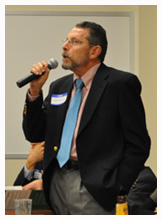 construction workers, and it’s almost impossible to find them today, much less going into the future.”
construction workers, and it’s almost impossible to find them today, much less going into the future.”
“In the first scenario, it seemed to me that a lot of the changes in the city came from money from additional taxes. As I look at where things are now in Washington, I think that would be a very divisive issue – how we would get the money for the increase in taxes. I don’t know individual businesses where that source of funding is coming from, and that’s one of those scenarios that I see a big problem or issue with. Primarily in the first scenario – I didn’t hear them talking about taxes in the blue scenario, but it seemed it was more dominant in the green scenario.”
“I keep thinking about whether you have the bodies trained and educated, the biggest 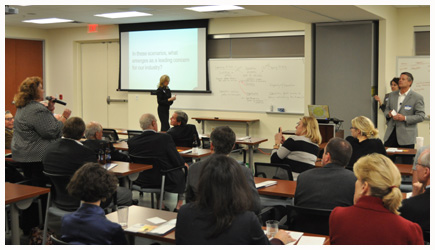 problem you have – and I don’t care what workforce it is, construction, whatever – you can interview 20 people and only one person will pass the drug test, or the alcohol test. And I think some of those social services that we need, it’s going to be critical because we need a healthy workforce, one is not reliant on drug, alcohol, and other social services. This would be a concern in both of the scenarios.”
problem you have – and I don’t care what workforce it is, construction, whatever – you can interview 20 people and only one person will pass the drug test, or the alcohol test. And I think some of those social services that we need, it’s going to be critical because we need a healthy workforce, one is not reliant on drug, alcohol, and other social services. This would be a concern in both of the scenarios.”
“I am a retired school principal, and what I am amazed and awed by is hearing the amount of comments about education. I have been out of awareness recently about what the State Board of Education 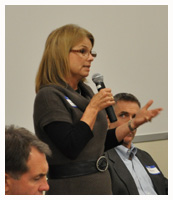 is doing, so I am kind of giving old facts. What I am hearing is a need to have a skilled, ready population. I’ve seen the State Board of Education, you know they determine what we do in our schools and what requirements that it takes for our students to graduate, and the pendulum swings from left to right. I remember around 20 years ago when they took out vocational tracks or courses. We couldn’t teach business math and that kind of course. Everyone had to take Algebra, Algebra 2, Geometry, Chemistry and these advanced courses, and it was sort of a one track for everybody except then you went into honors. So it seems to me, what I am hearing, is that there is a need to maybe go back, because as somebody said: not everybody’s going to be a doctor and need all of those high science and math courses. We do need to teach those, but it sounds like we need to somehow work with the education – the people who make the changes in education and the State Board of Education – we need a liaison there to say ‘this is what we really need’.”
is doing, so I am kind of giving old facts. What I am hearing is a need to have a skilled, ready population. I’ve seen the State Board of Education, you know they determine what we do in our schools and what requirements that it takes for our students to graduate, and the pendulum swings from left to right. I remember around 20 years ago when they took out vocational tracks or courses. We couldn’t teach business math and that kind of course. Everyone had to take Algebra, Algebra 2, Geometry, Chemistry and these advanced courses, and it was sort of a one track for everybody except then you went into honors. So it seems to me, what I am hearing, is that there is a need to maybe go back, because as somebody said: not everybody’s going to be a doctor and need all of those high science and math courses. We do need to teach those, but it sounds like we need to somehow work with the education – the people who make the changes in education and the State Board of Education – we need a liaison there to say ‘this is what we really need’.”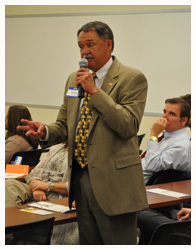 “I can answer your question. We have an organization within this city with some of the construction industries that we are trying to recruit high school students into the construction industry. We have training programs, we have people that will go out to the schools and try to get the students involved and take these classes and get skills. There’s plumbing, electricity, whatever. And we’re finding it very hard to get these students to come forward because the education system is promoting the other end of the spectrum. And a lot of these students, we have jobs for them. But as the lady said, if you can’t pass the drug test, if you can’t pass the background test, then you can’t work for the oil industry. That’s the bottom line. There are plenty of people in this city that could work, but they can’t work in the industry that we are pursuing in this [Playing to Win] scenario. We are in a global industry that is getting modulized, we are outsourcing, we are working with other countries, to get products added. You can say this about the architectural firms: the review of the drawings are now going to another country for reviews. They can come back like that [speaker snaps], and they can do it for a tenth of the price, and that’s what we are facing in
“I can answer your question. We have an organization within this city with some of the construction industries that we are trying to recruit high school students into the construction industry. We have training programs, we have people that will go out to the schools and try to get the students involved and take these classes and get skills. There’s plumbing, electricity, whatever. And we’re finding it very hard to get these students to come forward because the education system is promoting the other end of the spectrum. And a lot of these students, we have jobs for them. But as the lady said, if you can’t pass the drug test, if you can’t pass the background test, then you can’t work for the oil industry. That’s the bottom line. There are plenty of people in this city that could work, but they can’t work in the industry that we are pursuing in this [Playing to Win] scenario. We are in a global industry that is getting modulized, we are outsourcing, we are working with other countries, to get products added. You can say this about the architectural firms: the review of the drawings are now going to another country for reviews. They can come back like that [speaker snaps], and they can do it for a tenth of the price, and that’s what we are facing in 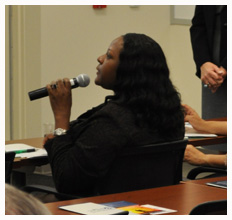 some of this. But the education portion, actually, for the construction industry is there, and we are trying very hard to get it done. We can’t get the education industry to come to us to help us put this together. Education is not meeting the demand of industry.”
some of this. But the education portion, actually, for the construction industry is there, and we are trying very hard to get it done. We can’t get the education industry to come to us to help us put this together. Education is not meeting the demand of industry.”
“I am with SER – Jobs for Progress. We actually offer a three course construction training program. One of the concerns for us is working with ex-offenders after they have completed the training and getting them into the workforce. That’s been a hard road to travel for those students – incorporating ex-offenders into the workforce.”
What actions should the construction industry take today in an effort to positively affect our future? “This may sound a little far-fetched, but I think that we need to be reaching out to the middle schools and earlier, even, to make sure that these kids understand that the choices that they start making about their lives, about whether they do drugs or how they live their lives is going to affect their future that soon. We were talking about people not passing the drug test and they could never work for the oil companies because they have a prison record. Some of that gets set much, much earlier than I think we realize.”
“This may sound a little far-fetched, but I think that we need to be reaching out to the middle schools and earlier, even, to make sure that these kids understand that the choices that they start making about their lives, about whether they do drugs or how they live their lives is going to affect their future that soon. We were talking about people not passing the drug test and they could never work for the oil companies because they have a prison record. Some of that gets set much, much earlier than I think we realize.”
“It seems like the main difference between the two scenarios is the focus on education and what  type of education. And what we really need is education producing skill-ready graduates for not only our industry, but all the other industries that need blue collar workers. That’s where we’re hurting. A story I heard several years ago: Mechanical Contractors Association were going to visit high schools to recruit students to come in to be HVAC techs. And the resistance they met from a guidance counselor who did not want them speaking to students, because every student who went into their program did not go to college and was a detrimental mark on their track record of the number of college admissions. So they were showing these kids that in 5 or 6 years, they could be making 70 or 80 thousand dollars, and they were not being allowed to come into the school and talk to the kids. So what we need today is what someone else was saying, we need to take immediate action to get with the powers that be in our educational system, and get that re-directed to produce a certain number of graduates that are job-skill ready. Everyone doesn’t need to go to college and take a liberal arts curriculum.”
type of education. And what we really need is education producing skill-ready graduates for not only our industry, but all the other industries that need blue collar workers. That’s where we’re hurting. A story I heard several years ago: Mechanical Contractors Association were going to visit high schools to recruit students to come in to be HVAC techs. And the resistance they met from a guidance counselor who did not want them speaking to students, because every student who went into their program did not go to college and was a detrimental mark on their track record of the number of college admissions. So they were showing these kids that in 5 or 6 years, they could be making 70 or 80 thousand dollars, and they were not being allowed to come into the school and talk to the kids. So what we need today is what someone else was saying, we need to take immediate action to get with the powers that be in our educational system, and get that re-directed to produce a certain number of graduates that are job-skill ready. Everyone doesn’t need to go to college and take a liberal arts curriculum.”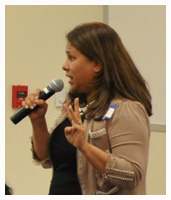 “I am with SER – Jobs for Progress. We have a new program at SER and it is called Coaching to Care. It is funded by the Department of Labor, and it is a 2 year program. I find this really interesting: it’s not just funded by the Department of Labor, the colleges have collaborated with the Department of Labor to do a 2 year pilot program to bring vocational classes back into training facilities – we being one here in Houston – to train individuals who dropped out of school in the medical field. So maybe the construction industry needs to come up with a scenario like that. However I will say as a trainer and a facilitator for SER Jobs, it’s a little bit difficult when we catch them at age 18, 19, 20 when they already have 2 kids, 3 kids, and they’re struggling. So if the construction industry does something like that in Houston, then catch them at an earlier age. I am sure you would agree with me on that one.”
“I am with SER – Jobs for Progress. We have a new program at SER and it is called Coaching to Care. It is funded by the Department of Labor, and it is a 2 year program. I find this really interesting: it’s not just funded by the Department of Labor, the colleges have collaborated with the Department of Labor to do a 2 year pilot program to bring vocational classes back into training facilities – we being one here in Houston – to train individuals who dropped out of school in the medical field. So maybe the construction industry needs to come up with a scenario like that. However I will say as a trainer and a facilitator for SER Jobs, it’s a little bit difficult when we catch them at age 18, 19, 20 when they already have 2 kids, 3 kids, and they’re struggling. So if the construction industry does something like that in Houston, then catch them at an earlier age. I am sure you would agree with me on that one.” “I just want to say that as somebody who came relatively late in my personal career to the construction industry, that I don’t think that the leaders who are largely represented in this room have done as much as they might do to tell their stories and talk about what kinds of success that they have been able to have from the diverse backgrounds and different educational tracks that they may come from or their families may come from. I went the Ivy League route, and continue to be amazed at the skills, abilities and success of my colleagues in this industry many of whom didn’t ever get a college degree. I don’t think that story gets told as much as it could and should.”
“I just want to say that as somebody who came relatively late in my personal career to the construction industry, that I don’t think that the leaders who are largely represented in this room have done as much as they might do to tell their stories and talk about what kinds of success that they have been able to have from the diverse backgrounds and different educational tracks that they may come from or their families may come from. I went the Ivy League route, and continue to be amazed at the skills, abilities and success of my colleagues in this industry many of whom didn’t ever get a college degree. I don’t think that story gets told as much as it could and should.”
What role can you play, or can your business play, in shaping the future of the construction industry?
“I was just thinking that there is a huge thrust right now in robotics, and a lot of the schools are participating, and they have teams. Couldn’t we do something in the constriction industry, the same kind of things, because math and everything else is in construction, it takes that kind of background. Just like robotics has taken over, why couldn’t construction take over? Create a desire with some competition.”
“One of the things I think we need to do is we need to define what is the construction industry? Let’s define what the construction industry is. Is the construction industry the architects and the general contractors? Is it the architects, the general contractors, and the subcontractors? Or does it also include the beneficiaries of our work? I 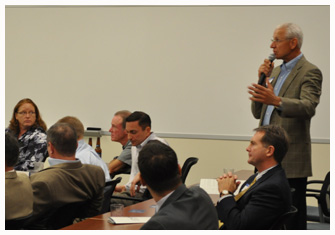 think the owners have been lacking greatly. I think the owners, the users of construction, of our services have been greatly lacking in this process, because we are the ones that they look to to provide the trained workforce. Quality standards keep getting greater and greater. They are looking for more, more, more for less money, less money, less money. And in the environment here in this market, it leads to incredible abuse of labor. We all know here that a great majority of the work in Houston, Texas gets done by labor that no one pays any payroll taxes on, nobody pays any workers’ compensation on them, they don’t have any benefits of any kind, and yet, who is the ultimate beneficiary of that cheap work? The owners are. But when you continue to invest in that type of business model for your workforce, someday you’re not going to have a workforce. I think as we define the construction industry, as people think about this, that it needs to be thought of in a much broader fashion as we address some of these problems going forward, and we have to have the owners buying in, in addition, on how we solve these problems. Because we can’t solve them alone, and as long as the owners are willing to hire people that basically don’t play by the rules, I don’t think these problems will ever get fixed.”
think the owners have been lacking greatly. I think the owners, the users of construction, of our services have been greatly lacking in this process, because we are the ones that they look to to provide the trained workforce. Quality standards keep getting greater and greater. They are looking for more, more, more for less money, less money, less money. And in the environment here in this market, it leads to incredible abuse of labor. We all know here that a great majority of the work in Houston, Texas gets done by labor that no one pays any payroll taxes on, nobody pays any workers’ compensation on them, they don’t have any benefits of any kind, and yet, who is the ultimate beneficiary of that cheap work? The owners are. But when you continue to invest in that type of business model for your workforce, someday you’re not going to have a workforce. I think as we define the construction industry, as people think about this, that it needs to be thought of in a much broader fashion as we address some of these problems going forward, and we have to have the owners buying in, in addition, on how we solve these problems. Because we can’t solve them alone, and as long as the owners are willing to hire people that basically don’t play by the rules, I don’t think these problems will ever get fixed.”
“Both of these scenarios are kind of scary for me to listen to. I have an 8 month old, so in 2040 he’ll roughly be my 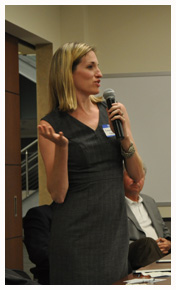 age. And I think a lot of what people are saying has to do with education, but if you look at this question here, really, for me, the best thing that I can do – my husband and I work together for my father in a company of 20 people – we can be positive, that’s all we can be. I think a lot of people in the construction industry can either be positive about what our future is going to be or they can be negative. Negative is not going to get any of us anywhere, especially if you are a mother of an 8 month old who is probably going to come to the family business at some point, so I think for all of us, whether you want to strive to get our education better, which has my biggest support. I think that our education system needs work, that it’s not going to get better if we don’t work on it. But definitely, if we can just all stay positive. The construction industry has provided my family a great success, and I am fortunate for what my father has done for me and my family. We wouldn’t be that way if my father didn’t have a positive outlook. Yes, it has been a struggle for the past few years, but we are looking to the future, that it’s going to get better. So I think all of us just need to, whatever it is that we need to strive to work for, we need to just be positive. The construction industry is fantastic, and we’re blessed to be in Houston. They’re good scenarios to just make you think, but it is scary to watch.”
age. And I think a lot of what people are saying has to do with education, but if you look at this question here, really, for me, the best thing that I can do – my husband and I work together for my father in a company of 20 people – we can be positive, that’s all we can be. I think a lot of people in the construction industry can either be positive about what our future is going to be or they can be negative. Negative is not going to get any of us anywhere, especially if you are a mother of an 8 month old who is probably going to come to the family business at some point, so I think for all of us, whether you want to strive to get our education better, which has my biggest support. I think that our education system needs work, that it’s not going to get better if we don’t work on it. But definitely, if we can just all stay positive. The construction industry has provided my family a great success, and I am fortunate for what my father has done for me and my family. We wouldn’t be that way if my father didn’t have a positive outlook. Yes, it has been a struggle for the past few years, but we are looking to the future, that it’s going to get better. So I think all of us just need to, whatever it is that we need to strive to work for, we need to just be positive. The construction industry is fantastic, and we’re blessed to be in Houston. They’re good scenarios to just make you think, but it is scary to watch.”
“In the era of Steve Jobs passing a few weeks ago, let’s think a little bit about innovation, let’s think a little bit outside the box. I think back, it was before my time in 1928, the Empire State Building was built. If you think of the 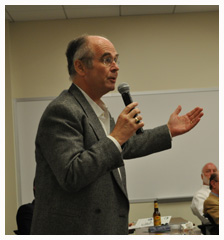 innovation in 1928 that was represented by the Empire State Building: structural design, electricity, elevators, all of those kind of things. I think what’s happened in the construction industry since 1928 – we could certainly do a lot better job. Look at the difference in the aviation industry, in the automobile industry, or the computer industry – fundamental changes. We are still doing things roughly the same basic way. Another example: houses wear out, buildings wear out, everything else in this economy wears out and we figure out how to dispose of it, but we’re not very good at doing that with old buildings. They populate our streets. Look at a big part of the central business district buildings that have been vacant for 30 to 50 years. We’ve got to think about the full cycle. And since I’ve been with the city I’ve been trying to understand why some things – and I will argue that the regulation of the public sector puts the construction industry... I would like to invite that the leadership in this room sit down with people like us [who work for the city] and collaboratively think about what are we really doing here? How could we better house all of the functions that we all have to live and work within? In other words, yes, labor is part of it, no question. Economics is also part of it. Materials are part of it. But thought and creativity are as well. And let’s really try to figure out what the pinch points of our business really are. We need more innovation.”
innovation in 1928 that was represented by the Empire State Building: structural design, electricity, elevators, all of those kind of things. I think what’s happened in the construction industry since 1928 – we could certainly do a lot better job. Look at the difference in the aviation industry, in the automobile industry, or the computer industry – fundamental changes. We are still doing things roughly the same basic way. Another example: houses wear out, buildings wear out, everything else in this economy wears out and we figure out how to dispose of it, but we’re not very good at doing that with old buildings. They populate our streets. Look at a big part of the central business district buildings that have been vacant for 30 to 50 years. We’ve got to think about the full cycle. And since I’ve been with the city I’ve been trying to understand why some things – and I will argue that the regulation of the public sector puts the construction industry... I would like to invite that the leadership in this room sit down with people like us [who work for the city] and collaboratively think about what are we really doing here? How could we better house all of the functions that we all have to live and work within? In other words, yes, labor is part of it, no question. Economics is also part of it. Materials are part of it. But thought and creativity are as well. And let’s really try to figure out what the pinch points of our business really are. We need more innovation.”
Following this group discussion, the attendees were introduced to our website, ConstructionCitizen.com, and to the Houston Associated General Contractors’ initiative Construction Career Collaborative, and encouraged to participate in the future of the industry.



Add new comment